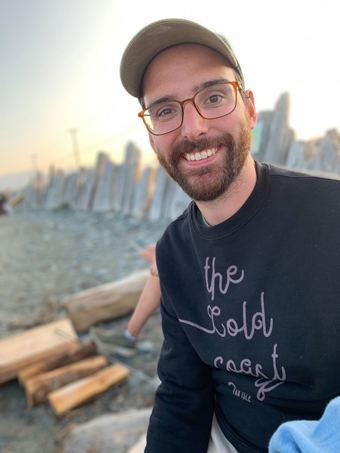|
Elizabeth Henry Scholarship - 2019 Recipient > 2019 posted on 11:45 AM, October 1, 2020
“Many thanks are due to the Elizabeth Henry Scholarship’s support of our project which works with Hul’qumi’num Elders and younger generations to connect and revitalize knowledge and practices related to lhuq’us.” — Jack Baker The Fraser Basin Council congratulates Jack Baker, recipient of the 2019 Elizabeth Henry Scholarship About JackJack Baker was born and raised on Vancouver Island where he quickly developed a fascination with the surrounding environments and the changes taking place in them. He earned his Bachelor of Science in Geography and Environmental Studies at the University of Victoria (UVic) in 2016. He is currently completing a Master’s in Anthropology at UVic. During his undergraduate degree, Jack worked in the Department of Anthropology’s Ethnographic Mapping Lab, developing various mapping projects focused on land and governance rights of Hul'qumi'num communities and their relation to ongoing conservation and resource development issues on South Eastern Vancouver Island. The creation of these maps and other online materials illuminated the pressing environmental and legal concerns of the communities he grew up beside and the ongoing work in these communities toward self governance and cultural revitalization. About this ProjectHul’q’umi’num’ peoples in the Salish Sea have concerns about the environmental health of their lands and waters and a desire to establish a baseline of information about the status of culturally significant species in the Salish Sea. The culturally important edible marine seaweed lhuq’us (the Hul’q’umi’num’ language name for red laver pyropia spp.) is frequently identified by Elders as important. These species have achieved little systematic attention from federal and provincial regulatory agencies because they are neither economically significant as commercial species nor identified as vulnerable as “endangered species.” This project engages community members in dialogue around reviving /revitalizing cultural practices around seaweed. The project draws on the methodologies of both anthropology and geography to ethnographically engage with knowledge holders on lhuq’us and the places it is found, and to use UAV survey methodology to map the extent and health of lhuq’us within Hul’q’umi’num’ peoples’ territories. 2020 Project Details & UpdateHul’qumi’num communities on south eastern Vancouver Island have concerns about the status and safety of marine foods potentially impacted by environmental change and the urbanization and industrialization of their territories. Collaborative research undertaken with the Hul’q’umi’num’ Lands and Resources Society is part of a broader effort to revitalize cultural practices, language, and food systems. Lhuq’us (the Hul’q’umi’num’ language term for pohrpyra/pyropia spp. (commonly known as red laver or black gold)) is a flavourful and nutritious intertidal seaweed that grows on rocky beaches across the Pacific Northwest. Hul’q’umi’num’ language, cultural values, teachings, and family histories are all interwoven into the harvesting and consumption of lhuq’us in Hul’qumi’num territories. Lhuq’us is one of the species that have been persistently mentioned in conversations with state regulatory agencies and though these concerns have been raised for at least two decades there has been no systematic monitoring of the species. There are two broad streams of inquiry taken by this thesis. The first, employing ethnographic methodology including interviews and observant participation, seeks to both document the cultural values, oral histories, lived experiences associated with lhuq’us as well as concerns for the future collaborators have for lhuq’us and lhuq’us beaches. The second stream, based in a geographic approach, asks whether Unoccupied Aerial Vehicle (UAV) technologies could be employed to record the status of lhuq’us as a baseline for monitoring. Two study sites in the Salish sea were surveyed using UAV techniques: ȾEL,IȽĆ and St’utl’qulus. The overall accuracies of the UAV imagery classifications and the particular accuracies of the class representing lhuq’us suggest that UAV technologies paired with Google Earth Engine (GEE) object-based image analysis (OBIA) methodologies can effectively detect lhuq’us. There are serious concerns and cultural values and practices deeply interconnected with culturally important species like lhuq’us. Through holding these concerns and values side by side with systematic observation and analyses maps and materials were created which communities can use to assert their rights, enact their own monitoring of territories and re-prioritize environmental decision-making done by federal, provincial, and municipal management agencies. “The generous support from the Elizabeth Henry Scholarship made possible several key components of the project. Funds from the scholarship were allocated for analyzing the heavy metal content of samples of lhuq’us harvested and dried in culturally important places in the gulf islands to assess the safety of continuing to consume these foods. The aerial survey of lhuq’us on the St’utl’qulus study site was also largely made possible by the support provided by the Elizabeth Henry Scholarship. Many thanks are due to the Fraser Basin Council for their support of this community lead project and attaining tangible materials which will be used to continue to care for and protect Hul’qumi’num culturally important seaweeds in the future.” – Jack Baker
|
||
- About Us
- Programs & Services
- Climate Change & Air Quality
- Watersheds & Water Resources
- Sustainable and Resilient Communities
- Our Work in the Regions
- Resources
- News and Events


